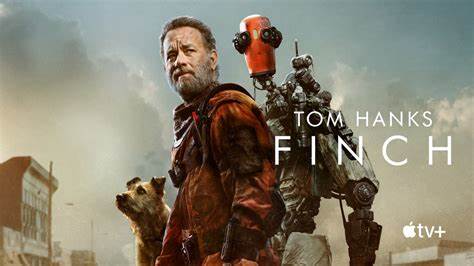Apocalypse and popcorn


In a bleak future, where solar flares removed ozone from the atmosphere and turned the Earth into a wasteland graveyard, former robotics engineer Finch embarks on a journey to the western United States in hopes of finding better habitable conditions for him and his canine companion Goodyear. Joining them is Jeff, a man-made robot for the specific purpose of caring for the dog once his protector’s terminal illness prevents him from continuing.
Lovers of Sunday films may not be motivated by the synopsis of this new production by director Miguel Sapochnik (“Repo men”) for several reasons: the end of the world, almost absolute extinction of the human race including the same protagonist who from the first moments he makes it clear that he will not reach the end. But, fortunately for those just looking to have a smooth afternoon, “Finch” is not your typical apocalypse movie, nor is it intended to provoke tearful reactions.
The first ace up his sleeve to ensure a minimum audience is the main role assumed by Tom Hanks, who already demonstrated with “The Castaway” that he alone is enough to get a film forward. It is no coincidence that Robert Zemeckis intervenes as one of the executive producers alongside Steven Spielberg’s company Amblin. But this time the dialogues are not with the immovable Wilson, but the automaton he has created, voiced by Caleb Landry Jones (“Antiviral”, “Get out”). Sapochnik in the direction of feature films has not had as many recognitions as in that of emblematic episodes of television series (an example is the unforgettable “Battle of the Bastards” from “Game of Thrones”), but it was attended by veteran screenwriters of the caliber by Craig Luck (“Solo: a Star War story”) and Ivor Powell (“Alien,” “Blade runner”). The soundtrack was provided by the renowned Argentine Gustavo Santaolalla.

Engineer Finch (Tom Hanks) builds the robot Jeff to ensure the care of his dog. Frame.
With a plot that shows clear references to other exponents of the cinematographic genre (“The road”, “I am a legend”, “Chappie”, “Wall-E”), video games (“Fallout”) or even classics of science fiction literature Like Harlan Ellison’s “Bird of Death”, “Finch” is a natural product of his production team, a film about the imagined future, but with multiple reminiscences of the past, of the cinema of the ’80s and’ 90s. The character played by Hanks sees the end of his days approaching, and to grant a guardian to the other living being that has accompanied him for years, the Goodyear dog (with all intention I avoid the word “pet”), spends the hours to build a humanoid robot and download millions of scanned book data into its brain.
Once the robot is activated, we witness another process already seen but no less fascinating, which is the awakening of the automaton consciousness. Jeff acts like a gifted child: his wisdom about the world is unfathomable except in human emotions and complexities. It is here that perhaps the film’s greatest contribution is revealed, the existential duality to which this character is led, because in the long journey of his learning from Finch’s hand, he manages to provoke in the viewer the empathy of recognition. The painstaking voice work of Landry Jones manages to break through the blankness of the metallic face to recreate fear, sadness and pride in small triumphs. Possessing only 72% of the information that Finch could provide him, brings him closer to the characteristic imperfection of man than to the usual efficiency of the machine.
Hanks’ role differs little from those played many times in his career. However, the traditional sympathy is sometimes replaced by the irritation of the sick and lonely man, who is desperate to win the race with the time he has left. His life has never had the familiar touch, and when he finally finds the other being that really matters to him, he hands over his greatest work: a caregiver who will not die from exposure to sunlight, and also has a fourth directive, to that end. correct the Asimov who did not include the life of animals as another valuable and worth saving possession. As he teaches Jeff the concept of humanity, he is also recovering his.

From the hand of Finch, the robot Jeff will learn about the values of the human being and the need not to lose hope. Frame.
It is clear that, with this film, Sapochnik wanted to avoid the innate moments of all post-apocalyptic history. Here there will be no dangerous mutants or fights to the death for a can of preserves, just foreshortened landscapes and dangerous vehicles kept at a distance. The more than anguished atmosphere reveals nostalgic for the lost. But despite the magnificent scenery and dramatic construction of the film, the absence of risks is too accused.
“Finch” remains in the exhibition aspect of the cinematographic genre, without pretending to be more than a miscellany of homages to the classics. The script becomes predictable and hollow by using only the facilities of its director to ensure audience: Tom Hanks, the clumsy robot and a lovable dog. It is not surprising that in the face of Universal Pictures reluctance to release it due to the Covid delays, it ended up selling the film to Apple TV to adapt it to a family audience.
Environmental awareness, the lights and shadows of humanity and the value of the company are presented as the principles that the film highlights and places it within the vast list of forgettable productions with good intentions. It is true that there will be words to explain to the little ones such as “apocalypse” or “death”, but in general it will not interfere with the time that the family dedicates to spend a good Sunday of movies and popcorn.
Datasheet
🎬 Title: Finch
⭐️ Rating: 6.2 / 10 (2048 votes)
📅 Year: 2021
⏳ Duration: 115 min.
🗺 Country: United States
👤 Direction: Miguel Sapochnik
✍️ Guion: Craig Luck, Ivor Powell
🎵 Music: Gustavo Santaolalla
📷 Photography: Jo Willems
👥 Reparto: Tom Hanks, Marie Wagenman, Caleb Landry Jones
🏢 Productora: ImageMovers, Amblin Entertainment, Dutch Angle, Misher Films, Robert Zemeckis, Apple TV+
🔰 Genre: Science fiction, Drama
In Picta
Reference-www.cubadebate.cu
